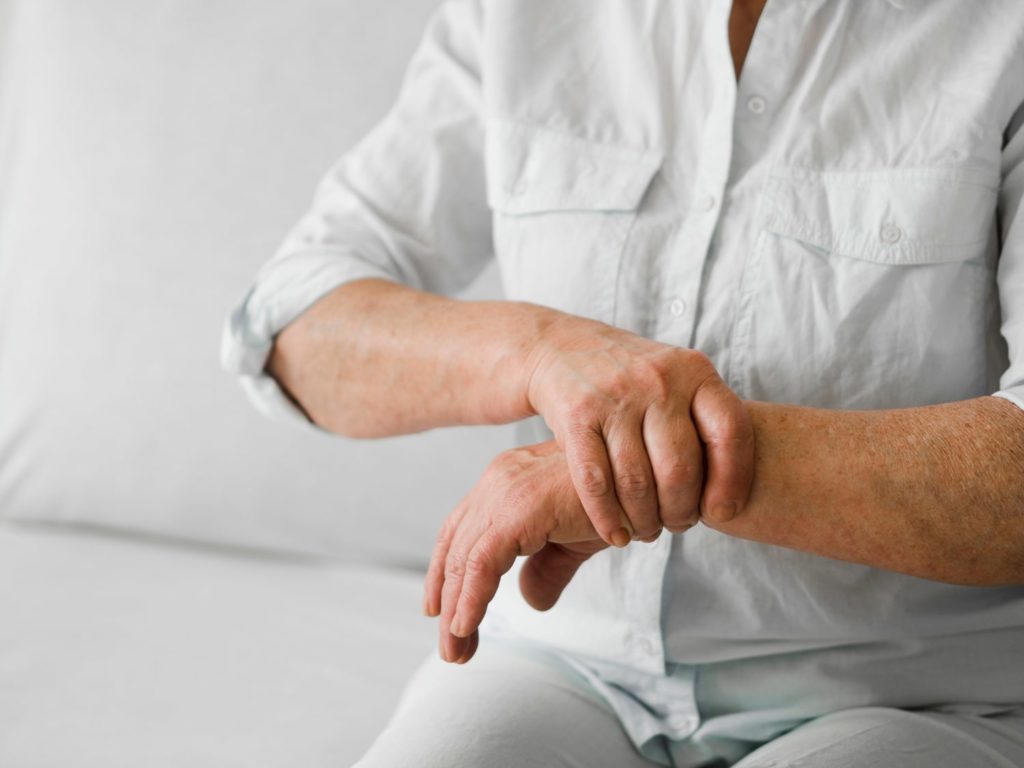
Annemieke Van Dam
(DipCAH, RSH.DipPH, WCA Cert. Wellness Coaching)
This article is the first of a two-part series on how hypnotherapy can help with autoimmune diseases. In part one we will investigate how hypnotherapy and complementary techniques can assist with
- Arthritis
- Multiple sclerosis
- Psoriasis
- Autoimmune Pericarditis
- Lupus (Systemic Lupus Erythematosus)
First, we’ll look more closely at autoimmune diseases and common factors.
What are autoimmune diseases?
Our immune system is a network of cells and tissues in the body that work together to defend us from viruses, bacteria, and infection. It tries to identify and destroy the invaders that might hurt us.
In autoimmune diseases, proteins known as autoantibodies target the body’s own healthy tissues by mistake, signalling the body to attack them.
Doctors don’t know exactly what causes the immune system to misfire. Yet some people are more prone to autoimmune disease than others.[1]
Common factors that can increase our risk of developing an autoimmune disease can include:
- Sex: females aged 15-44 are more prone to autoimmune diseases than men.
- Family history: inherited genes or environmental factors.
- Environmental factors: exposure to sunlight, mercury, chemicals like solvents or those used in agriculture, cigarette smoke, or certain bacterial and viral infections.
- Ethnicity: some autoimmune diseases are more common in people in certain groups. For example, white people from Europe and the United States may be more likely to develop autoimmune muscle disease, while lupus tends to occur more in people who are of African American, Hispanic, or Latino descent.
- Nutrition: our diet and nutrients may impact the risk and severity of autoimmune disease.
- Other health conditions: certain health conditions, including obesity and other autoimmune diseases, may make us more likely to develop another autoimmune disease.
Researchers have identified more than 100 autoimmune diseases. The following are some common examples:
- Type 1 diabetes
- Rheumatoid arthritis
- Psoriatic arthritis
- Multiple sclerosis
- Inflammatory bowel disease
- Graves’ disease
- Sjogren disease
- Myasthenia gravis
- Celiac disease
- Pernicious anaemia[2]
Autoimmune diseases cannot be cured but can be managed with therapies, healthy lifestyles and medications. Symptoms can come and go. Episodes of more noticeable and severe symptoms are called flares or attacks.[3]
The link between the mind and autoimmune diseases
George Solomon of Stanford University was the first American physician who studied the interaction between the mind and the immune system in the 1960s.
He observed that patients with rheumatoid arthritis would typically enter a relapse during times of stress and hypothesised that the immune system was very sensitive to stress and responsive to emotions and thoughts.
The mind affects the immune system
This and subsequent research have led to the understanding that the mind affects the immune system by secreting neurotransmitters and hormones.
RELATED — Neurotransmitters: Serotonin 5-HT (for mood, sleep and digestion)
These then activate specific receptors on the surface of T and B lymphocytes, which either suppress or enhance the activity of cells of the immune response.[3]
How hypnotherapy can help with autoimmune diseases
People suffering from an incurable chronic disease, including autoimmune diseases, usually experience pain, anxiety, financial and other emotional burdens.
Thus, a vicious circle of worry and pain due to the disease and stress often develops, promoting the autoimmune processes and influencing an unfavourable effect on the course of the autoimmune disease, escalating the pain level.
Hypnotherapy supports healthy habits and reduces stress, benefiting those with autoimmune diseases. It can promote calmness and immune balance, and it also helps to ease pain, improve sleep and to reframe negative thoughts.
RELATED — How does hypnotherapy work: Rewire your Subconscious Mind
A two-part study involving 47 asthma patients who are sensitive to house dust or pollen, showed that hypnosis can positively influence the immune response.
In the first part of the study, patients were randomly assigned to either a hypnosis group or a control group. They were tested twice, two weeks apart. The control group did not receive hypnosis, while the hypnosis group experienced hypnosis during the second test session, following three training sessions.
Hypnosis included instructions to reduce skin reactions. All patients had allergens applied to both forearms at four different strengths. With hypnosis, reactions were reduced on both arms, significantly so with weaker allergens.
In the second part, the remaining patients were divided into three groups. Each group received three hypnosis sessions over two weeks with different instructions
- reducing reactions on both arms
- only on the right arm
- or no specific immune-related suggestions
Compared to their initial assessments, all groups showed reduced reactions on both arms as a positive influence on the immune system.[5]
Arthritis
Arthritis causes swelling and tenderness in one or more joints, leading to pain and stiffness that often worsen with age. The most common forms are osteoarthritis and rheumatoid arthritis.
Research conducted on 17 respondents with Rheumatoid Arthritis showed that before hypnotherapy 100% of the respondents felt moderate pain.
After hypnotherapy 77% (14) felt mild pain and 22.17% felt moderate pain showing that hypnotherapy can be effective in reducing pain.
In a study of 30 arthritis pain sufferers, who graded their pain before and after hypnotherapy, showed results where hypnotherapy reduced sensations of pain as shown in the Table below.[6]
Participants | Pain scale | Before | After |
1 | 2 | 0 | 4 |
2 | 3 | 0 | 2 |
3 | 4 | 2 | 12 |
4 | 5 | 3 | 2 |
5 | 6 | 11 | 6 |
6 | 7 | 6 | 3 |
7 | 8 | 3 | 1 |
8 | 9 | 9 | 0 |
9 | 10 | 2 | 0 |
Total | 30 | 30 | |
Distribution of pain level before and after hypnotherapy (0 = no pain and 10 = extreme pain).
Based on the above table, and before doing hypnotherapy, 36.7% had a pain scale of 6 and 20% a pain scale of 7. After hypnotherapy 40% experienced a pain scale of 4 and 20% a pain scale of 6.
Psoriasis
Psoriasis is a chronic skin condition that causes itchy, scaly rashes, often on the knees, elbows, scalp, and trunk. It has no cure and can be painful, disrupt sleep, and affect focus.
Symptoms usually come and go in cycles, with flare-ups when the immune system is triggered.
Psoriasis treatment with hypnosis is not well studied, but some case reports show improvement or remission using suggestion, relaxation, or psychotherapy resulting in significant improvement or complete remission.
Two cases in which psychiatric patients with long-standing psoriasis, receiving imipramine, were given a direct suggestion that imipramine would assist with their skin disease.
One patient experienced complete remission while the other was greatly improved. When seen 4 months later, both patients had maintained their improvement because of the force of suggestion.
A man with a 20-year history of psoriasis and a history of social withdrawal was treated using hypnosis with imagery. After several months he showed significant satisfactory improvement and maintained this improvement when seen later at follow-up.[6]
Hypnosis and guided imagery technique can assist with skin issues
In a small study of 11 psoriasis patients, skin-related hypnosis was used in 5 subjects, and neutral hypnosis was used in 6 people in a control group in which no skin improvements were suggested.
After three months of different hypnosis methods, disease-specific suggestions were introduced to see if they affected those previously given neutral hypnosis.
Researchers found highly hypnotizable psoriasis patients improved slightly more. Even moderately responsive individuals showed progress with targeted hypnosis after limited results from neutral sessions.[7]
Multiple Sclerosis
Multiple sclerosis is an immune system disease where the protective sheath that covers nerve fibre, known as myelin, is attacked. This interrupts communication between the brain and the rest of the body. Eventually, the disease can cause permanent damage of the nerve fibres.
In a literature review of the effectiveness of hypnotherapy in treating multiple sclerosis, two groups of volunteers were tracked for symptoms over six months while undergoing hypnotherapy:
- Group 1 (7 started, 5 completed) had 12 sessions
- Group 2 (17 started, 10 completed) had 12 sessions.
had symptom tracking and completed a Quality-of-Life Questionnaire.
Ten participants from these groups formed Group 3 for six additional sessions using modern hypnotherapy. Hypnotherapy for Group 3 focused on
- symptom causes
- resolving inner conflicts
- reframing disease perceptions
- learning self-hypnosis
Techniques for Group 3 included additional suggestions which included
- muscle relaxation
- suggestions for well-being
- addressing beliefs, boundaries, and future outlooks
to alleviate depression, fatigue, pain, and more.
The study showed promising results for Group 3 participants, who were monitored over a nine-month period. Eight of the 10 participants completed the Quality of Life Questionnaire. Of these, six participants using the questionnaire reported improvements in
- cognitive function – increased from 65% to 95% in nine months
- energy levels – increased from 30% to 60%
- pain reduction – up to 50% less
- physical health scores – increased from 45% to 60%
- mental health scores – increased from 50% to 80%
Some participants reported being symptom-free, including those with remitting or progressive MS, recent diagnoses, and cases spanning 30+ years.[8]
Autoimmune Pericarditis
Autoimmune pericarditis is a form of pericarditis which involves inflammation of the protective sack around the heart that is called the pericardium. It causes chest pain and can cause other symptoms of discomfort such as down the arms and shoulder area.
A case study of a married mother of two was seeking to control stress, worry and anxiety that she believed was responsible for her relapsing symptoms of chest pain, inflammation and fluid retention in her pericardial space with fluid retention which required aspiration.
While experiencing her symptoms the woman learned guided imagery self-hypnosis, imagining relaxing ocean scenes using all her senses.
This resulted in immediate relief of her stress and anxiety and relieved her pain symptoms. She self-reported a reduction of chest pain from 8 down to 2 on a scale of 10-1. After eight weeks the woman reduced her pain medication after having hypnosis.
Additionally, the woman’s resting heartbeat reduced from 92 to 72 within an eight-week period. The woman also used guided imagery to reduce inflammation and instruct her subconscious mind to accept her cells as her own.
Eight weeks after her hypnosis began the woman’s cardiologist advised the woman she was in remission and the woman was able to reduce her prednisone medication and she was able to discontinue the medication six months later.[4]
Lupus (Systemic Lupus Erythematosus)
Lupus is an autoimmune disease where the immune system attacks the body’s own tissues and organs. The resulting inflammation can impact various systems, including the joints, skin, kidneys, blood, brain, heart, and lungs.
A case study of a 33-year-old mother of two was suffering from a remitting-relapsing form of lupus. She wanted to learn the use of mind-body meditation to reduce her symptoms and achieve remittance. She believed stress to be the cause of her relapses.
To initiate remission the woman used metaphors in guided and self-hypnosis, utilising images of imagined aggressive creatures being rounded up by an alpha white horse, the process of which the aggressive creatures transformed into white horses.
In hypnosis she also drew associated pictures with crayons. The woman also practiced self-hypnosis using guided imagery for healing and recovery. Following this the woman reported improvement in her overall health and a significant reduction in the redness of her skin. A month later she self-reported the successful completion of the transformation of her immune system, as it now knew how to identify her own and invading organisms.
She experienced clinical improvement in her condition and two months later her rheumatologist declared she had achieved full remission.[4]
Annemieke Van Dam is the founder of Livewell Hypnotherapy, and is a hypnotherapist and life and wellness coach operating onsite and online, New Zealand wide and internationally…
If you would like to learn more about Annemieke, see Expert: Annemieke Van Dam.
References
(1) National Institute of Arthritis and Musculoskeletal and Skin Diseases 2023. Autoimmune Diseases.
(2) Watson, S. 2024. Everything to know about autoimmune diseases. Retrieved from: the most common autoimmune diseases? https://www.healthline.com/health/autoimmune-disorders#common-autoimmune-diseases
(3) Cleveland Clinic. 2024. Autoimmune diseases. Retrieved from: https://my.clevelandclinic.org/health/diseases/21624-autoimmune-diseases
(4) Torem, M. S. (2007) Mind- Body Hypnotic Imagery in the Treatment of Auto-Immune Disorders. American Journal of Hypnosis (October 2007)
(5) Gruzelier, J. H. 2001. A Review of the Impact of Hypnosis, Relaxation, Guided Imagery and Individual Differences on aspects of Immunity and Health. Taylor and Francis Health Sciences.
(6) Ridawati, I. D. Oktaviani, E. Wijaya, S. 2021. The Effectiveness of Hypnotherapy on Arthritis Pain in the Elderly.
(7) Tausk F, Whitmore SE. 1999. A pilot study of hypnosis in the treatment of patients with psoriasis. Retrieved from https://www.immunoloco.com/en/hypnosis-in-autoimmune-diseases
(8) Clark, E. M. 2015. The Effectiveness of Hypnotherapy in Treating Multiple Sclerosis.






